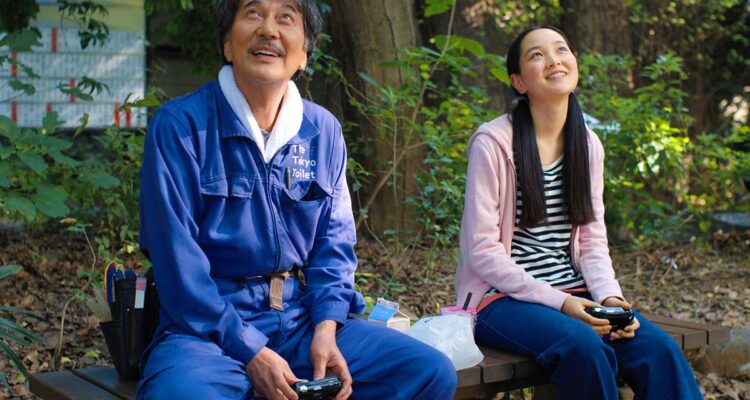The official synopsis for Wim Wenders’ “Perfect Days” is one of those rare occasions when a tightly-described premise encapsulates the immensity of a film: a janitor in Japan drives between jobs listening to rock music. In this case, the janitor is Hirayama (Koji Yakusho), an older man whose job is cleaning Tokyo’s elegantly designed public toilets. The rock music is a potpourri of classics, played straight out of rare cassettes lovingly inserted in the deck of Hirayama’s cleaning van.
READ MORE: 2023 Cannes Film Festival: 21 Must-See Movies To Watch
Music not only dramatically punctuates key moments in Wenders’ latest but acts as an inspired contrast to the quietness of the protagonist. Hirayama is a daytime flanêur whose routine consists of listening: to others, to the city, and to nature. A collector of not only sounds but images, he carries an old film camera in the front pocket of his overstuffed Tokyo Toilets overall at all times, snapping shots of tree branches as the wind cuts through the branches, pulling leaves from fertile wood and onto barren concrete.
Nothing is too small a detail to Hirayama. Every morning, he wakes up and neatly tidies his bed, inspecting and watering his plants, living organisms growing in an otherwise sterile environment. Overalls on, van off, cassette in, and so begins the steady routine of work. Water in the bucket, mop in the water, scrubbing the bowl, washing the floors. This is a man to who work is not complete if not pristine; the wash-up routine only finished once a small mirror has made its way through all the nooks and crannies of all the nooks and crannies, hunting and sorting all sneaky smudges foolish enough to believe they could escape.
“Perfect Days” is a film about an experienced filmmaker drinking from the fountain of other experienced filmmakers, a sprawling narrative text bound to unspool in all its richness upon revisiting. At first glance, it is hard not to see this as Wenders honoring Japanese giant Yasujirō Ozu again; Wenders already made the tender and warmhearted “Tokyo-Ga” in 1985 about the master filmmaker.
And set aside the obvious geographical correlation, the film is stitched with threads of serenity, allowing for even the smallest of interactions to unfold with unspared, gentle Ozu-ian patience. There are nods to another Japanese great, too, with Akira Kurosawa’s signature attention to the dramatic value of opposition honored through the overwhelming nature of hormone-infused teenagers, who cut through silence with brainless enthusiastic chatter, and the loudness of the bars and restaurants where the man sits night after night, carefully turning in to the conversations happening around him.
Also acting as opposing forces are Hirayama’s swan song job and the little that is teased of his upbringing. In this conflict lies the step that almost threatens to trip “Perfect Days,” a film whose commentary on class begins to be laid out but is never quite fleshed out with the patience — or detailed interest — of all else. A brief visit by Hirayama’s teenage niece Niko (Arisa Nakano) acts as the past walking into the present, a brief window into the reasoning behind the man’s self-imposed isolation but of little help when searching for a deeper understanding of his current economic predicament.
Don’t get me wrong; this isn’t a hunt for overexposed answers to neatly tie all hanging loose ends, but Wenders loving framing of Hirayama’s often grueling labor stands in nagging contrast to the realities of the job. Frustration is quickly diluted in service of reinforcing the central character’s enlightenment, a repeating arc that muddles the refined treatment of the film’s accompanying themes. “Perfect Days” tries its best to find fulfilment in the mundane labour as Jim Jarmusch does with the titular bus driver character in “Patterson” but this particular arc fails to join the film’s many laurels.
Alas, what is a laurel — and perhaps the greatest of them all —- is Yakusho, whose central performance carries most of the weight of Wenders’ latest. In a role almost entirely void of dialogue, the veteran actor (and the film’s co-producer) finds the words where there are none, translating with small glances what no intricate lines ever could. His performance reaches an apex whenever music blasts through the speakers, the frame drenched by the unmistakable notes of classics such as The Animal’s “The House of the Rising Sun” and Nina Simone’s “Feeling Good” as Hirayama soaks in the images and smells and sensations of his surroundings, life, lived with such clarity, nothing more than a sequence of beautifully lived, perfect days. [B+]
Follow along with all our coverage from the 2023 Cannes Film Festival.

